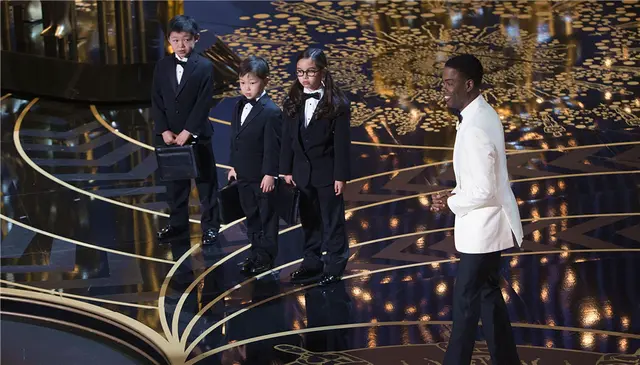The offensive Asian joke during this year's Oscar show not only sparked outcry from Asian-Americans but also revealed the worsening racial divide in the U.S. society.
Hosted by comedian Chris Rock, the 88th Academy Awards dipped to an eight-year ratings low and offended at least two dozen Asian academy members with a racially insensitive joke at the expense of Asian-Americans.
On Tuesday, the Academy of Motion Picture Arts and Sciences apologized for the skit that was complained by many as "tasteless and offensive."
At one point of the February show, Rock introduced the "bankers" from finance firm PricewaterhouseCoopers onto the stage, then it turned out to be three Asian kids with briefcases, as a joke for Asians being only good at maths.
Then he proceeded to joke, "If anybody's upset about that joke, just Tweet about it on your phone that was also made by these kids."
Basketball player Jeremy Lin was outrageous. "Seriously though, when is this going to change? Tired of it being "cool" and "OK" to bash Asians," he posted on his Twitter account.
Apart from the joke that upset Asian-Americans, the evening's "relentlessly black and white" take on diversity also disheartened many by how nonblack minorities are portrayed or ignored by Hollywood.
Throughout the three-and-a-half hour show, Rock never stopped joking about racism in Hollywood, but his attack on the industry's diversity failures was fully black-centric.
The host seemed to forget that, not just black actors and filmmakers were snubbed and overlooked by the Academy of Motion Picture Arts and Sciences, but Asians, Hispanics and Native Americans too.
For the second consecutive year, all 20 nominees for acting awards were white. No minority-themed movies were nominated for Best Picture, and even the ones nominated for other categories, the nomination goes to a white writer or a white supporting actor.
Ironically, Hispanics, Native Americans and other minorities were totally left out of the host's conversation.
A recent study by the USC Annenberg School for Communication and Journalism found that at least half of all TV or streamed projects from September 2014 to August 2015 and of the 2014 films studied lacked even one speaking or named Asian or Asian-American character. Of lead characters that were minorities in 100-plus movies, nearly 66 percent were black and 6.3 percent were Asian.
Rock's own blind spot in the racial issue illuminated the systemic and ever worsening racial problems in America that go beyond the Oscars. It is a sad fact that racial discrimination and ethnic tensions have already become major challenges to the integrity of the U.S. society.
After the Oscar show, 25 members of the academy -- among them two-time best director Ang Lee and "Star Trek" actor George Takei -- have sent a letter to the academy's Board of Governors in which they criticized the "tone-deaf approach to portray of Asians."
"We'd like to know how such tasteless and offensive skits could have happened and what process you have in place to preclude such unconscious or outright bias and racism toward any group in future Oscars telecasts," the group said in the letter.
In response to the letter, the academy said in a statement that it "appreciates the concerns stated, and regrets that any aspect of the Oscar telecast was offensive. We are committed to doing our best to ensure that material in future shows be more culturally sensitive."
The academy's apology, though lacking of specific measures to deal with the issue, might be able to ease public outrage to some extent, but it can not gap the deep racial divide that has long been plaguing the nation and even showed signs of escalation over the years.
It can only be hoped that the U.S. authorities can seriously deal with the issue before such serious challenges eventually erode the country's system and jeopardize its stability.
 简体中文
简体中文

